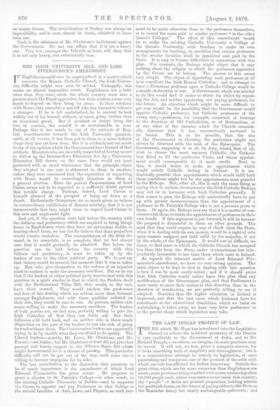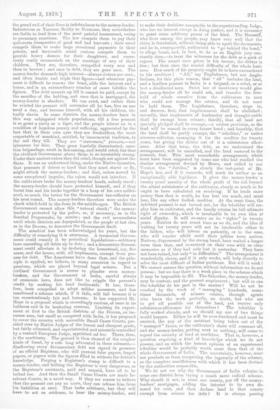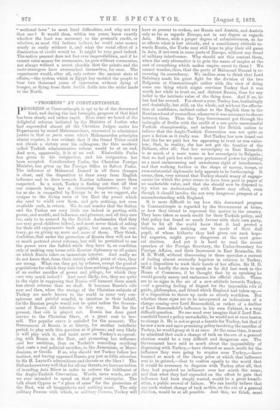THE LAST INDIAN PROJECT OF LAW.
THE Bill which Mr. Hope has introduced into the Legislative Council to relieve the indebted peasantry of the Deccan is very creditable to the Government of India, and to Sir Richard Temple,—to whom, we imagine, its main provision may be traced. It will not, we fear, prove a complete success, for it lacks something both of simplicity and thoroughness ; but it is a conscientious attempt to remedy by legislation, at once painstaking and temperate, one of the greatest of the evils with which our rule has afflicted the Indian democracy. Outside the great cities, which are far more numerous than Englishmen are aware, some provinces being studded with towns containing often 50,000 people each, whose very names never reach this country, the " people " of India are peasant proprietors, holding minute but profitable farms, on the tenure of paying either to the State or the Zemindar heavy but nearly unchangeable quit-rents ; and
the grand evil of their lives is indebtedness to the money-lender. Industrious as Tuscans, thrifty as Normans, they nevertheless are liable to lead lives of the most painful harassment, owing to pecuniary exactions. The law compels them to pay their quit-rents irrespective of good and bad harvests ; their creed compels them to make large occasional payments to their priests, and inexorable social custom compels them to provide heavy dowers for their daughters, and exces- sively costly ceremonials on the marriage of any of their children. They are, therefore, compelled every now and then to borrow ; and once in debt, they are gone men. The money-lender demands high interest—always sixteen per cent., and often double and triple that figure—and whenever pay- ment is difficult he renews the bond, adds the interest and a bonus, and in an extraordinary number of oases falsifies the figures. The debt mounts up till it cannot be paid, except by the sacrifice of the holding, and once that is mortgaged, the money-lender is absolute. He can evict, and rather than be evicted the peasant will surrender all he has, live on one meal a day, and become himself, with all his children, vir- tually slaves. In some districts the money-lenders have in this way subjugated whole populations, till a free peasant is as great a rarity as a tiger, and the people labour on in a condition of hopeless penury and suffering, aggravated by the fact that in their own eyes they are freeholders, the most respectable of mankind, entitled, by immemorial tradition, to the soil they till. They are " statesmen," yeomen,—not labourers for hire. They grow fearfully discontented, sanc- tion brigandage, exult in fire-raising, and would rebel, but that the civilised Government above them is so irresistibly strong. Under their ancient rulers they did rebel, though not against the State. It was an understood thing, under the Native dynasties, that peasants if driven so hard that they must starve or fly, might attack the money-lenders ; and that, unless moved by some exceptional impulse, the rulers would not interfere. If the cultivators broke the money-lenders' heads, nobody cared ; the money-lender should have protected himself, and if they burnt him and his books together in a heap of his own millet- seed, so much the bettor for the Government tax-collector on his next round. The money-lenders therefore were under the check which held in the Jews in the middle-ages. The British Government cannot allow th'Is "natural check;" the money- lender is protected by the police, or, if necessary, as in the Sonthal Pergunnahs, by armies ; and the evil accumulates until whole districts are depopulated, or the people at last rise, as in the Deccan, to denounce the Government itself.
The mischief has been acknowledged for years, but the difficulty of remedying it is enormous. A tyrannical Govern- ment could remedy it by periodical liquidations—arbitrary laws cancelling all debts up to date ; and a democratic Govern- ment could alleviate it by declaring the homestead, say, five acres, and the house, with all implements, exempt from pro- cess for debt. The Americans have done that, and the prin- ciple is applied, we believe, in many countries in regard to pensions, which are placed beyond legal seizure. But a civilised Government is averse to plunder even money- lenelers, and the Government of India, careful always of economic laws, does not like to cripple the peasant's credit by making his land inalienable. It has, there- fore, been compelled to adopt milder measures, and has sanctioned a scheme which, if it fails, will fail because it is too conscientiously fair and humane. It has supported Mr. Hope in a proposal which is exceedingly curious, at once in its boldness and in its hesitating reserves. Limiting its experi- ment at first to the British districts of the Deccan, an im- mense area, but small as compared with India, it has proposed to cover the country with accessible Small Cause Courts, pre- sided over by Native Judges of the lowest and cheapest grade, but faiely educated, and superintended and minutely controlled by a trained European Judge, appointed ad hoc. There, then, is the machinery. The ground is then cleared of the rougher kinds of fraud, by a rule long advocated in these columns,— disallowing every documentary debt not signed in presence of an official Registrar, who will prevent false papers, forged papers, or papers with the figures filled in without the debtor's knowledge. Forging a Registrar's stamp is difficult to a money-lender, and bribing the Registrar is very dangerous, as the Registrar's assistants, paid and unpaid, have all to be bribed too. And then the Small Cause Courts are made In- solvent Courts, in a novel way. If they see reason to believe that the peasant can pay no more, they can release him from his liabilities at once. That looks arbitrary, but they will have to act on evidence, to hear the money-lender, and
to make their decisions acceptable to the superintending Judge, who has no interest except in doing justice, and it is necessary to grant some arbitrary power of the kind. The Moonsiff, who lives among the people, may know very well that the claim is fraudulent, without being able to upset the documents, and he is, consequently, authorised to "go behind the bond," to allege fraud, and, in fact, to do as an English jury con- stantly does,—to treat the witnesses for the debt as a pack of rogues. The award once given in his favour, the debtor is free ; but then rises the crucial difficulty of the whole busi- ness. How much of his property ought he to have surrendered to his creditors? "All," say Englishmen, but not Anglo- Indians, for this plain reason, that " all" includes the land, and a landless peasant in India is a brigand, or a rebel, or at best a disaffected man. Strict law of insolvency would give the money-lender all he could ask, and transfer the free- hold of whole counties from the cultivators to men
who could not manage the estates, and do not want to hold them. The Legislature, therefore, steps in, and decrees, first, that imprisonment shall be abolished ; secondly, that implements of husbandry and draught-cattle shall be exempt from seizure ; thirdly, that all land not specially pledged shall be exempt,—a useless provision, as the land will be named in every future bond ; and fourthly, that the land shall be partly exempt, the " tehsildar," or native revenue-collector, managing it for the creditor for twenty years, but giving the debtor out of it a subsistence allow- ance. After that term, the debt, as we understand the arrangement, will be cancelled, and the land restored to the peasant, free. This most remarkable arrangement, which must have been suggested by some one who had studied the similar arrangement devised by Moses, and called in our Version the " Jubilee," is clearly the test-point of Mr. Hope's law, and if it succeeds, will mark its author as an exceptionally able legislator. It gives the money-lender a twenty years' annuity of the whole profit of the soil beyond the actual subsistence of the cultivator, clearly as much as he ought to have calculated on receiving. If he lends more money than that is worth, he has lent too much, and must lose, like any other foolish creditor. At the same time, the indebted peasant is not turned out, for the tehsildar will em- ploy him as cultivator, and the family retains its full ultimate right of ownership, which is invaluable to its own idea of social dignity. It will re-enter on its "rights" in twenty years. Natives do not count time as we do, and the idea of waiting for twenty years will not be intolerable either to the father, who will labour on patiently, or to the sons, who will wander afield until their jubilee term arrives. Natives, dispossessed by the strong hand, have waited a longer term than that, and re-entered on their own with as clear memories as if they had only lost it yesterday. They have not been ruined, but only " in difficulties." The arrangement is wonderfully clever, and if it only works, will help directly to solve the most difficult of Indian problems. But will it work ? We cannot answer the question, without information we do not possess ; but we fear there is a weak place in the scheme which it may be impossible to fill. The Sahookar, the money-lender, may be content, and the peasant acquiescent ; but will or can the tehsildar do his part in the matter B Will he not be crushed by the work of " managing " hundreds, some- times thousands, of minute estates, through agents who know the work perfectly, no doubt, but who are to get all possible out of the land, yet receive only
subsistence-allowance for themselves ? The tehsildar is fully worked already, and we should say one of two things would happen. Either he will be over-burdened and must be assisted, the pay of the assistant being taken out of the " managed " farms, or the cultivator's share will consume all, and the money-lender, getting next to nothing, will come to regard the security of land as worthless. That is, however, a question requiring a kind of knowledge which we do not possess, and on which the honest opinion of an experienced tehsildar would be probably worth more than that of the whole Government of India. The uncertainty, however, must not preclude us from recognising the ingenuity of the scheme, or the complete unselfishness with which it has been devised by the authorities responsible. We do not see why the Government of India refrains in some one district from trying a much more radical scheme.
Why should it not, in some one county, pay off the money- lenders' mortgages, adding the interest to its own de- mand for rent, and then declare land in that county exempt from seizure for debt It is always passing " sectional laws " to meet local difficulties, and why not try that one It would then, within ten years, know exactly whether the land was necessary to the peasant's credit, or whether, as most Old Indians believe, he could raise money nearly as easily without it, and what the social effect of a diminution of credit would be. It might be very good indeed. The native peasant does not fret over impossibilities, and if he cannot raise money for ceremonies, he goes without ceremonies, not always without a secret chuckle that the priests and the caste-managers have overreached themselves, for once. The experiment would, after all, only restore the ancient state of affairs,—the system which in Egypt has enabled the people to bear two thousand years of oppression without dying of hunger, or flying from their fertile fields into the wider lands to the North.




































 Previous page
Previous page